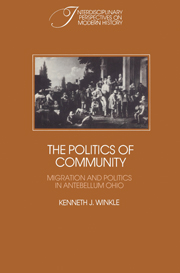Book contents
- Frontmatter
- Contents
- List of tables and figures
- Preface
- Introduction
- 1 The tide of emigration
- 2 An electorate in motion
- 3 From meeting to election: migration and suffrage
- 4 The defended community: migration and elections
- 5 “A movable column”: migration and voting
- 6 The core community: migration and leadership
- 7 Migration and local politics: an antebellum election
- Conclusion
- Notes
- Bibliography
- Index
4 - The defended community: migration and elections
Published online by Cambridge University Press: 06 October 2009
- Frontmatter
- Contents
- List of tables and figures
- Preface
- Introduction
- 1 The tide of emigration
- 2 An electorate in motion
- 3 From meeting to election: migration and suffrage
- 4 The defended community: migration and elections
- 5 “A movable column”: migration and voting
- 6 The core community: migration and leadership
- 7 Migration and local politics: an antebellum election
- Conclusion
- Notes
- Bibliography
- Index
Summary
On October 10, 1848, Riley F. Warner came to Liverpool, Ohio, to vote in the gubernatorial election. While he was at the polling place, another voter challenged his eligibility to vote there. Warner himself believed that he was a legal resident of Liverpool Township, but he had trouble convincing the election judges. As Warner put it, “I considered Liverpool my home as much as any where,” and, after all, he had been born in Liverpool. “My father's people lived there, and I returned to Liverpool as often as once in two weeks.” The board of election judges asked him a few questions, but when asked if he was indeed a resident, Warner had to admit that he wasn't quite certain: “I did not understand what constituted a resident sufficiently to answer.” The judges asked Warner a few more questions, haggled over his ballot, and then rejected it. “One of the board stated that the answers were satisfactory to him,” Warner recalled later, but “the two others decided that I was not a voter, and rejected it.” Warner rode out to two other townships to vote, but the judges rejected his ballot there as well. Riley Warner, in fact, was not certain just where he resided legally and so could not vote anywhere that day.
Riley Warner's half-hearted confrontation with Liverpool's election judges and his frustrated attempts to vote in three different townships in one day demonstrate the dilemma that many migrants faced in exercising their political rights before the Civil War.
- Type
- Chapter
- Information
- The Politics of CommunityMigration and Politics in Antebellum Ohio, pp. 71 - 87Publisher: Cambridge University PressPrint publication year: 1988



